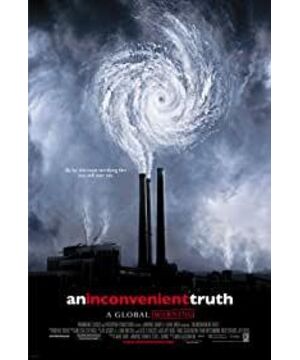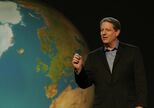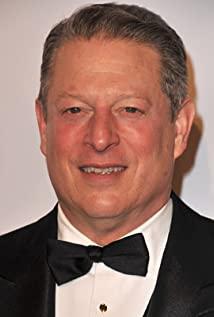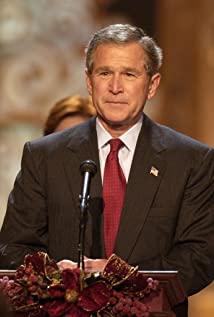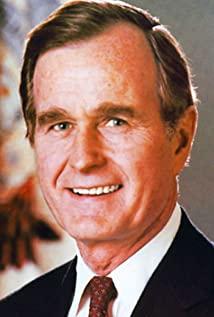——Comment on the movie "An Inconvenient Truth" (An Inconvenient Truth),
what Christianity, Islam, Buddhism, Confucianism, in the face of the new God of the environment, in the larger scale of the environmental protection movement Before the crusades, all were overshadowed.
It has unified the spirit of people all over the world. Who dares to say that he is unwilling to protect the environment?
To say that it is a religion is mainly based on its two characteristics. (If the word "religion" has a positive and healthy meaning to you, then the practical word "ideology" can also be used. No matter what word is used to summarize its essence, in short, I mean, environmental protection is a difficult The phenomenon of neglect is also a ubiquitous landscape in this landscape society, and because it is ubiquitous, it is easier for us to ignore it, as the so-called "elephant is invisible, but loud and loud.")
First of all, religion It is the spiritual opium of the people. Opium anesthetize the human spirit. Religion releases people’s anxiety and guilt. More importantly, religion regards every single touch in daily life as hard struggle with a great goal. In this respect, people who feel that they are insignificant gain a sense of existence: what I do Everything in China can have a great meaning and be part of a noble cause; but on the other hand, it also ensures that daily life and the existing system will not be changed. The combination of these two effects is the so-called mental anesthesia.
People in the past were afraid of death, so they told themselves that there was an afterlife; they were afraid of the omnipotent God who punishes evil and promotes good, so they confessed their disgraceful secrets to the pastor. People nowadays don’t even think that they will die, so even the older people need to beautify and exercise. They are afraid of the ubiquitous “invisible hand” that eats the weak, so they put their own shameful secrets. Report to a counselor. What will happen in the future? Will people in the spacecraft admire the mushroom cloud while dedicating the most beautiful words to a small blue dot in the sky?
The core doctrine of religion is always simple. Confucianism requires people to settle down, Christianity requires people to believe in God, and Buddhism requires people to be indifferent to fame and fortune. What does environmental protection require us to do? Isn’t that clearer at a glance: just to protect the environment! The content of this film is even simpler: we have only one threat, which is global warming; there is only one source of threat, and that is our own carbon dioxide emissions; so we also have only one enemy, and that is our unwillingness to reduce emissions. CO2 politician. The content of the camera is constantly changing, which is also the original meaning of the term "movie": a motion picture, but the content of the narration just repeats these three sentences repeatedly. The moving pictures entice the audience to soberly enter a hypnotized state.
This is what Hollywood does best. Movies are the best ideological machine. Or to put it more bluntly, the movie is a tool to deceive the good people. Ironically, the audience knew that the movie was fake, but they were still cheated. Today's people are fascinated by "Avatar" and "Inception", and yesterday's people are talking about "Tunnel Warfare" and "Landmine Warfare". Judging from the number of moviegoers, Hollywood and Bayi Studios are actually no different, they are both successful models.
For the "documentary" "An Inconvenient Truth", people think it is true, but they are inevitably deceived by the one-sided "truth". Some are more obvious, while others are more subtle. For example, one of the three common misconceptions emphasized at the end of the film is that the scientific community has no consensus on global warming. As a refutation of this most common misunderstanding, Gore cited a set of data for comparison: Hundreds of articles on climate issues published in mainstream scientific journals for decades all believed that the earth is warming, and the main reason is Human carbon dioxide emissions are a different picture in the mass media. Articles supporting and opposing this conclusion are roughly divided in half. These data are of course true. The problem is that you can hardly imagine that real data can sometimes be used to tell lies. In this example, our fantasies and adoration of "scientists" and "mainstreams of science" make us unable to see the actual process of knowledge production. A more important fact is that since modern times, scientists have lost more and more political judgment. They actually only have professional authority and do not have the ability of universal intellectuals. However, due to the scarcity and degradation of the latter, These scientists are often pushed to the status of multi-talented intellectuals in the past to express their opinions to the masses, but they don't know that their expressions are likely to have been screened and filtered. These scientists are no longer the past gentleman scientists who do not consider livelihood issues and research purely for interest, but are professional scientists and scientists in the college system who want to run for five buckets of rice. They have a narrower field of vision and lack the ambition to understand the mystery of the entire world, so they are more likely to be deceived. Scientists were once worshipped because they were indeed close to the state of omniscience and omnipotence that people could think of at the time; however, time has passed and now, "scientists are also humans", and as long as they are humans, they will inevitably make mistakes, for example, in places with people. There are rivers and lakes, there are unspoken rules, which is hard to avoid. Gore accused the mass media of taking money from sponsors and deliberately spreading doubts and confusion, but did not say that the scientific community took money from the government, and the governments of many countries are just big companies or are developing in this direction. Here, we seem to be forced to fall into a question of choice of position: either support Gore or support the opponents of environmental protection. In fact, there is a third option hidden here: to oppose the two together, and at the same time, think about and explore the real path of human development. Development is not only GDP growth, which is already well known; however, development also does not mean merely maintaining forest coverage, or just making the sky bluer, mountains, clearer, and greener. This is also true in today's environmental protection movement. Need
The method of persuasion that religions like to use is carrots and sticks. If people who don’t believe in God will go to hell, then humans who don’t believe in environmental protection have already opened the door to hell; if people who love God will go to heaven, then people who devote themselves to environmental protection can also look forward to a paradise on earth in the future. of. The history of the Opium War reminds us that religion, like opium, cannot tolerate opposition or even doubt.
Religious advocates (equivalent to past missionaries) always use simple images to persuade people to accept its core doctrines. Confucianism tells people that there is sky above their heads (modern science only tells people that there is still sky beyond the sky), Christianity tells people that there are heaven and hell after death, and Buddhism tells people that a young man once sat under the Bodhi tree. What does environmental protection tell us? The earth is "our only home". The three key words here, "we", "unique" and "homeland", are all concise and irresistible: we think of familiar homes, of distant Noah's Ark, and of equal beings.
In this era when everyone can be famous for three minutes, there is a simple way to distinguish the real "worldly master" from the so-called "warlock", which is not to look at how he states the problem, but only how he analyzes the problem. The root cause, and more importantly, depends on how he proposes a solution to the problem. To point out a social problem in a simple way and vividly, all you need is a person’s ability to express and perform, because people immersed in this society can experience these problems: the truth is not easy to be ignored, the so-called "easy to ignore" The truth is always "more true". However, to point out the root causes and scenarios requires real imagination: this imagination comes from the depths of the individual’s heart, but also from the common nature of human beings, so only it dares to deny certain realities, even if These realities have long been ingrained, and people have long been accustomed to them.
The overall structure of the film is exactly this. In addition to the ending caption telling the audience what to do, the main part of the film is just like my analysis, just repeating three simple sentences, perhaps too simple judgments. Ironically, the ending subtitles seem to be the most informative part of the film. But what does it tell us? Walk more and take less car, take more buses and less car, buy more energy-efficient vehicles and less large displacement, eat more vegetables and less meat, increase the temperature of the air conditioner and lower the brightness of the screen, vote for those who promise to protect the environment or embark on environmental protection by yourself To participate in the election...
What a beautiful and innocent wish! Especially, it is so simple and easy to do! Just as Christians think that drinking wine is drinking the blood of Jesus, and eating bread is eating the flesh of Jesus. Just like Buddhists think that carrying wood and water is nothing more than a wonderful way. However, does this really work? I have no idea. At least from this video, I don’t see a good reason for doing this. At the end of the film, when refuting three common misconceptions, "I can't do anything" is one of them. Under Gore's sincere cry, in the simple slogan "I can also contribute to environmental protection", people's sense of powerlessness and lack of belonging in reality seem to have found the compensation they desire. I always feel that thinking that I can stop climate warming by turning on less air-conditioning is as innocent and ridiculous as thinking that I can comprehend the wonderful way if I am willing to eat and drink. Turn on less air conditioners, why not just not produce air conditioners? Use more energy-saving lamps, why don't you get up and take a rest at sunset? If we don’t use wood, what about the people who live by cutting down the virgin forest? If we don’t use paper, what about discarded computers? If an environmentally friendly and energy-saving car or electrical appliance has a shorter life span and is more prone to breakdown, is it still environmentally friendly? If cars can save energy, will our coal and oil run out? If there is an angel between clean energy and renewable energy, we don't need to be afraid of carbon dioxide emissions, how can the earth tolerate an expanding population?
Are these questions so simple?
Secondly, under the lofty cloak of religion often hides the lowest level of human impulse: working for one's own benefit. This kind of impulse itself is understandable, but it is easy to blind people from seeing Mount Tai. This is the root of human inequality and freedom, and the root of human beings desperately competing with each other to destroy the environment. But because people's spirits have been numbed, they won't go into the story behind it. Whoever has the power of interpretation and dissemination of religion has the important symbolic power, and since ancient times, "the one who wins the hearts of the people has the world."
The most obvious reflection in this movie is the incredible rendering of the narrator. Who is the narrator? Al Gore, an American who lost to Bush Jr. in a controversial presidential election. I say this kind of rendering is incredible because if you don’t know who this person is, you will be aggrieved when watching: I want to watch a documentary, not a personal image show! In the film, Gore's daily work, lecture tours, and alone contemplation scenes are interspersed without losing the opportunity. There is a large section of scenes that relive the scenes of Gore's election defeat. Towards the end of the film, Gore himself made the finishing touches: "What we lack is political will. In the United States, political will is a renewable resource." The subtitles at the end of the film are even more unremarkable. He vaguely made the words "vote for politicians who promise to protect the environment. If there is no such politician, then go to the election by himself." Isn’t Gore the most trustworthy person with a lovely smile, full of worry and enthusiasm?
This is a promotional film, a commercial, an image film, or more generally, a film. It even has elements of sitcoms: during Gore's speech, applause came from "live" from time to time. This mimics the effect of laughter off the court in a sitcom. Just as sitcoms stipulate where the audience should laugh and replace those who have lost the ability to laugh naturally, applause in the film also stipulates where the audience should express their strong approval (even if people are not used to applauding in a movie theater) And instead of people who are indifferent to public affairs, they are excited about an idea.
The only thing this film is not is what it claims to be: a documentary. It can even be said that there is no record of this film except itself. This does not prevent it from having a wealth of landscape content: riding a helicopter across the Arctic Ocean, an Apple computer on a desk, the fall of the Berlin Wall, beautiful glacier scenery, reminiscences of the happy days on the farm as a teenager, and speeches around the world. The audience listened attentively, the terrifying images of hurricanes and the heart-warming images of the earth, all kinds of dazzling charts and thrilling curves... Gore deserves to be a politician, who can arouse people's strong emotions. Things are just right. For example, assigning the United States’ refusal to reduce emissions to the manipulation of a small number of politicians and economic interest groups is in line with ordinary people’s suspicion of the power elite. On the one hand, it avoids talking about the injustice of the global economic structure and the U.S. military hegemony. . For example, on the one hand, I look back angrily on my defeat in the presidential election, and on the other hand, I have not forgotten to express my firm belief in the American democratic system many times. This is obviously telling people that Gore at least knows that he is an American. However, if a democratic system does not educate, inspire, and flog the ignorant and silent majority of people living in it, but to cater to their ignorance and fear, then how democratic is this democratic system? Is questionable. For another example, Gore emphasized at the end of the film (as a refutation of one of the three common misconceptions) that environmental protection and economic development are not contradictory, "environmental protection can bring more work." What a beautiful picture: the masters still enjoy the status of masters, the general public still works hard, and the promise of environmental protection is that the existing hierarchical society will have a more stable foundation. In the environmental protection movement, we are all members of the Great Harmony world, revisiting the ancient human ideals; after the environmental protection movement, we will return to Darwin's world and the ancient human reality.
Therefore, the overwhelming environmental protection argument has not concealed and secretly replaced the real political issues? How should people survive so that they can really live out a bit of "human" taste? The answer to this by the environmental protection argument may seem avant-garde, but in fact it is nothing more than the contemporary shadow of ancient Puritanism or asceticism.
Religion is always a good thing, but it will only gradually degenerate. Christianity loves your neighbor as yourself, Confucianism does not do to others what you don't want, and Buddhism is empty. These are all good things, but the longer the time, the more monks will have their lips. So there was a bloody European religious war, there were thousands of years of Chinese three principles and five constants, and the Indian caste system that still exists today. The environment should be protected. It is as natural as we should raise our children, but it is just as difficult. I imagine that as long as you walk more and take less cars, take more buses and less cars, buy more energy-efficient cars and less large displacement, eat more vegetables and less meat, increase the temperature of the air conditioner and lower the brightness of the screen. Guilt, in fact, is just self-deception in good faith-although it is well-intentioned, it is still self-deception after all. Conclusions drawn without questioning are unreliable, just as life without reflection is not worth living. We must not only refute those who think that environmental protection has nothing to do with us, but also be wary of those who advocate environmental protection everywhere, because the absurdity of the former is easy to see, and the mistakes of the latter are more thoughtful.
In the past, religion used buildings to make people awe, while environmental protection movements used images in the mass media to make people dizzy. The final effect is the same: in the boundless landscape, in the constant viewing, people gradually no longer have the will and ability to think and act.
Today, anyone can give themselves a dazzling halo under the banner of environmental protection, and then under the cover of the halo, secretly pass through the warehouse, stuff in unknown quantities of private goods, and obtain unknown amounts of benefits. In countries where media supervision is less developed, there will only be more dirty deals under the halo. This is the real "truth that is hard to ignore."
View more about An Inconvenient Truth reviews


